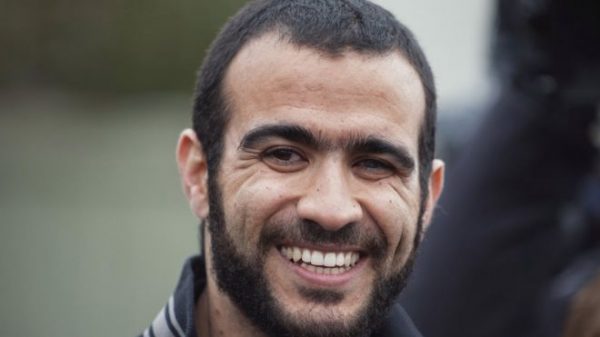 Canada will issue an apology and compensation to former Guantanamo Bay detainee Omar Khadr for abuses he suffered while in prison, reports say.
Canada will issue an apology and compensation to former Guantanamo Bay detainee Omar Khadr for abuses he suffered while in prison, reports say.
Canadian-born Khadr, 30, was convicted in 2010 by a US military commission of killing a US soldier in Afghanistan.
He was captured in 2002 at the age of 15 and spent a decade in the US prison.
In 2010, Canada’s Supreme Court ruled that he was interrogated under “oppressive circumstances.” He will reportedly be paid Ca$8 million
Khadr’s lawyers met with justice department attorneys last month to reach the deal, the Toronto Star newspaper reported, quoting unnamed sources.
The announcement of an official apology and compensation would be made next week, the reports added.
When asked about the case, Canadian Prime Minister Justin Trudeau, would not confirm any details.
Khadr, who was the youngest prisoner ever detained at the naval base in Cuba, became a cause celebre for Guantanamo Bay opponents and his case received international attention.
He was convicted of five crimes, including throwing a grenade that killed Army Sgt Christopher Speer in 2002. He was shot and captured during the fire fight in Afghanistan.
Khadr said his confessions to US officials were made under duress
He was repatriated in 2012 after agreeing to a plea deal to leave Guantanamo and serve the majority of his eight-year sentence in Canada.
In 2010, Canada’s Supreme Court concluded that Canada’s conduct in connection with Khadr’s case “did not conform to the principles of fundamental justice” and violated his constitutional rights.
The court noted he was subjected to sleep deprivation to make him “less resistant to interrogation”.
In 2015, a judge released Khadr on bail despite a last minute appeal by the then federal Conservative government to keep him in jail. He said then that he would prove to Canadians that he was a “good person”.
Khadr is the son of an alleged close associate of Osama Bin Laden and was drawn into militant circles when he was young. He spent his youth in Canada and Pakistan, where his father had interests.
His case has long polarised public opinion in Canada. His defenders describe him as a child soldier while others argue he was a radicalised fighter at the time of his capture.
Profile: Omar Khadr
The son of an alleged close associate of Osama Bin Laden, Omar Khadr was drawn into militant circles before becoming a cause celebre for opponents of Guantanamo Bay.
Omar Khadr spent his youth between Canada, where he was born, and Pakistan, where his father had interests.
Ostensibly those interests were supporting charity work in Afghanistan and Pakistan, but according to the US government, Ahmed Said Khadr was a senior al-Qaeda member and helped fund terrorist training camps. He was arrested in 1994 in connection with the bombing of the Egyptian embassy in Pakistan.
The family moved to Jalalabad in Afghanistan in 1996, and the US alleges that the family had regular encounters with Bin Laden and other al-Qaeda leaders.
In the summer of 2002, according to US intelligence, Omar Khadr received personal weapons training and was subsequently part of a unit that turned landmines into homemade bombs.
In July of that year, the then 15-year-old was captured during a clash between US and Afghan soldiers, and a small group of militants.
Khadr was accused of throwing a grenade that killed a US soldier and injured another. He was shot and seriously wounded in the aftermath.
Khadr’s father was killed in Pakistan in 2003. His brother Abdullah was held for five years in Canada on US charges of supplying weapons to al-Qaeda, before being freed when a judge said he should not be extradited.
Khadr himself ended up in Guantanamo Bay. He and his supporters have complained about ill-treatment for several years.
Boycotting his tribunal in 2006, Khadr said he had been held in solitary confinement for long periods.
His lawyers have also argued that trying him for crimes allegedly committed as a juvenile violates international law.
They also said statements given by him were extracted with the use of indirect threats of rape and death.
The second person to face terrorism charges under the tribunal system, Khadr was charged in 2007 with murder and attempted murder, conspiracy, providing support to terrorism and spying.
The charges were thrown out by a US military judge two months later, prompting an appeal by the Pentagon. A military appeals court agreed that Khadr was designated an “unlawful enemy combatant” and that charges could proceed.
Canada’s Supreme Court ruled in 2008 that the government should have not handed over documents from Canadian interrogations of Khadr to the US.
In a video, released in 2008, showing Khadr being questioned by Canadian officials, the detainee complains of being denied access to proper medical treatment. In one section of the video an apparently disturbed Khadr repeatedly moans a phrase that sounds like “help me” or “kill me”.
Khadr was eventually sentenced to 40 years in prison by a US military tribunal at Guantanamo Bay in 2010 on war crimes charges – having pleaded guilty to killing the soldier.
But as part of his plea deal, his sentence was limited to eight years, and under the deal, he became eligible to return to Canada last October, before being eventually returned at the end of September 2012.
BBC

Leave a Reply
You must be logged in to post a comment.